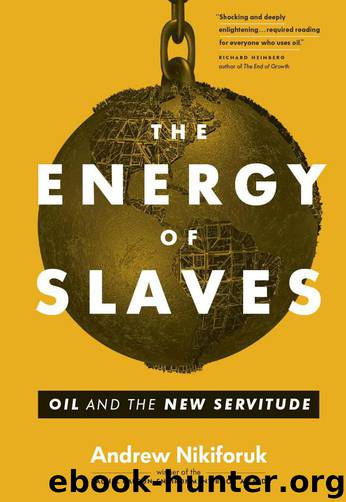The Energy of Slaves: Oil and the New Servitude by Nikiforuk Andrew

Author:Nikiforuk, Andrew [Nikiforuk, Andrew]
Language: eng
Format: epub
Tags: POL023000
Publisher: Greystone Books
Published: 2012-08-17T07:00:00+00:00
9. Peak Science
“[The blame for the future plight of civilization] must rest on scientific men, equally with others, for being incapable of accepting the responsibility for the profound social upheavals which their own work primarily has brought about in human relationships.”
Frederick Soddy, typescript, Bodleian Library, 1953
Long before Frederick Soddy pinpointed the wobbly foundations of economics, the maverick thinker worried about the future of science. If civilization squandered its fossil fuels on conspicuous consumption, the father of nuclear fission said in 1910, it was possible that science, perhaps in the form of atomic research, might save the day. Yet he recognized an obstacle. With the discipline’s “schoolboy successes” long past, the future of scientific endeavor lay not so much in discovering new things as in providing more consumptive services. Because the availability of energy slaves now drove innovation, Soddy forecast that science, a “fair-weather friend,” would peak along with energy consumption.
To Soddy’s mind, most academics and bureaucrats read science all wrong. Science “has been generally misunderstood as creating the wealth that followed the application of knowledge,” he wrote. Instead, Soddy reckoned, science was just one of the lucky inheritors of the surplus energy flows generated by fossil fuels. If atomic energy failed to produce “private suns” for citizens, he said, then science, a child of hydrocarbons, might have to wrestle with a more violent change in social and political habits than that wrought by the Industrial Revolution. “Curious persons in cloisteral seclusion are experimenting with new sources of energy, which, if ever harnessed, would make coal and oil as useless as oars and sails,” he lectured. “If they fail in their quest, or are too late, so that coal and oil, everywhere sought for, are no longer found, and the only hope of men lay in their time-honored traps to catch the sunlight, who doubts that galley-slaves and helots would reappear in the world once more?” Fossil fuels have energized science the way gasoline propels a car. For decades, chemists and physicists have pointed out that only about 14 to 25 percent of the fuel put into a vehicle actually gets used to move the transportation slave. The rest is lost in heat or squandered on distractions like heated seats. Powered by hydrocarbons, science performs the same way: it sometimes propels society down new paths with genuine discoveries, but most of the time it engages in elaborate forms of heat dissipation. Like the rest of the world, science has used fossil fuels to scale up and accelerate without much thought to the consequences. But without high energy flows, there wouldn’t be much science at all.
The field’s rapid ascension after 1820 confirms that science was, like abolition and massive city-making, an emission of concentrated hydrocarbon spending. Prior to the Industrial Revolution, the study of how the natural world worked was the preserve of a few curious scholars and philosophers. Solar- or human-powered science moved backwards and forwards, frequently stagnating. A remarkable calculator for measuring the motion of the planets, for example, appeared in Greece in 80 BC, only to disappear.
Download
This site does not store any files on its server. We only index and link to content provided by other sites. Please contact the content providers to delete copyright contents if any and email us, we'll remove relevant links or contents immediately.
International Integration of the Brazilian Economy by Elias C. Grivoyannis(110100)
The Radium Girls by Kate Moore(12018)
Turbulence by E. J. Noyes(8040)
Nudge - Improving Decisions about Health, Wealth, and Happiness by Thaler Sunstein(7692)
The Black Swan by Nassim Nicholas Taleb(7107)
Rich Dad Poor Dad by Robert T. Kiyosaki(6612)
Pioneering Portfolio Management by David F. Swensen(6288)
Man-made Catastrophes and Risk Information Concealment by Dmitry Chernov & Didier Sornette(6005)
Zero to One by Peter Thiel(5786)
Secrecy World by Jake Bernstein(4741)
Millionaire: The Philanderer, Gambler, and Duelist Who Invented Modern Finance by Janet Gleeson(4465)
The Age of Surveillance Capitalism by Shoshana Zuboff(4275)
Skin in the Game by Nassim Nicholas Taleb(4239)
The Money Culture by Michael Lewis(4198)
Bullshit Jobs by David Graeber(4179)
Skin in the Game: Hidden Asymmetries in Daily Life by Nassim Nicholas Taleb(3989)
The Dhandho Investor by Mohnish Pabrai(3759)
The Wisdom of Finance by Mihir Desai(3735)
Blockchain Basics by Daniel Drescher(3574)
